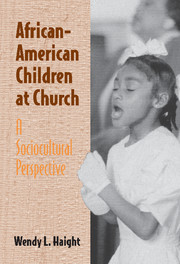Book contents
- Frontmatter
- Contents
- List of Tables
- Acknowledgments
- PART ONE OVERVIEW
- PART TWO PATTERNS OF SOCIALIZATION AND PARTICIPATION
- 4 African-Americans in Salt Lake City: A Historical and Social Overview
- 5 The Teachers
- 6 Adults' Perspectives on Spiritual Socialization
- 7 Narratives Related during Sunday School
- 8 Socialization and Participation through Storytelling
- 9 Adult–Child Verbal Conflicts
- 10 Other Contexts for Socialization and Participation
- PART THREE RELATIONSHIPS OF RESEARCH AND PRACTICE
- PART FOUR CONCLUSION
- References
- Index
6 - Adults' Perspectives on Spiritual Socialization
Published online by Cambridge University Press: 10 August 2009
- Frontmatter
- Contents
- List of Tables
- Acknowledgments
- PART ONE OVERVIEW
- PART TWO PATTERNS OF SOCIALIZATION AND PARTICIPATION
- 4 African-Americans in Salt Lake City: A Historical and Social Overview
- 5 The Teachers
- 6 Adults' Perspectives on Spiritual Socialization
- 7 Narratives Related during Sunday School
- 8 Socialization and Participation through Storytelling
- 9 Adult–Child Verbal Conflicts
- 10 Other Contexts for Socialization and Participation
- PART THREE RELATIONSHIPS OF RESEARCH AND PRACTICE
- PART FOUR CONCLUSION
- References
- Index
Summary
In describing to me her own spiritual socialization as a child, Sister Ima stressed the central role of adult church members:
I gathered my spirit from them. I saw what they did. I saw them pray. I saw what they were going through. I saw them read the Bible. I saw them sing, and they would sing joyously!
In this chapter, African-American adults reflect, in their own words, upon the meaning of spiritual socialization in their own lives and in the lives of their children and students. Their reflections provide an important context for interpreting adults' socialization practices at First Baptist Church. Indeed, a growing body of literature in cultural psychology describes the complex ways in which individuals' belief systems provide a frame of reference within which they interpret experience, and formulate goals and strategies for socialization (e.g., Goncu, 1999; Goodnow & Collins, 1990; Harkness & Super, 1996; Haight, Parke & Black, 1997). As we will see in this chapter, adults' beliefs may be described as childsensitive and growth-oriented. Adults were sensitive to children's emotional needs and relative immaturity. For example, they valued positive adult–child relationships as a prerequisite for effective socialization. Adults also expressed the importance for African-American children and youth to behave in a mature and highly competent fashion in order to survive and develop in neighborhoods and schools that they perceived to be racist.
- Type
- Chapter
- Information
- African-American Children at ChurchA Sociocultural Perspective, pp. 69 - 85Publisher: Cambridge University PressPrint publication year: 2001



